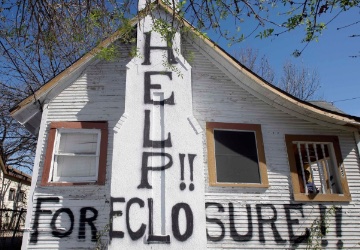Short sales and foreclosures are the main options available to homeowners when they get behind on their mortgage payments or if their mortgage is underwater (not worth what they owe on their mortgage). Regardless of the situation, the owner must part with their home. Still, the timeline and other outcomes are different, so it is important to understand the advantages and disadvantages of each option.
There is no obligation to short sell a home. Typically, a short sale occurs when the homeowner sells the property for less than the mortgage balance. For example, if a property owner owes $300,000 on their mortgage, but a financial hardship forces them to sell their home for $200,000, the homeowner will still be responsible for the remaining amount ($100,000) plus additional costs incurred in the sale.
Foreclosures, on the other hand, are involuntary. If the borrower fails to make a specific number of monthly payments, the mortgage holder (the bank or the lender) takes legal steps to take possession of the home. The lender recovers the mortgage debt through foreclosure by selling the mortgaged property.

Short Sale
A short sale cannot take place without the approval of the lender. Therefore, for a short sale to proceed, the mortgage lender - usually a bank - must approve the decision to proceed.
A short sale could result in a loss for the lending institution, so documentation explaining why one is necessary is also needed. It must be a recent event that caused the homebuyer financial trouble, such as illness, divorce, or job loss, and cannot be something that was not disclosed to the lender at the time of the first mortgage application. The borrower will appear dishonest if they do not disclose any previous financial problems to the lender.
Once a short sale is allowed, all proceeds go to the bank or lender; the homeowner receives nothing and is still liable for the mortgage. The lender has two options: either forgive the outstanding debt or seek repayment from the borrower through a deficiency judgment, which is a court order.

Foreclosure
Unlike short sales, foreclosure is started solely by the lending institution. The pre-foreclosure procedure doesn't start until a borrower has gone behind on their payments for a predetermined time. The foreclosure is the last stage of litigation by the bank to take possession of the property and recover their investment.
The laws that govern foreclosure proceedings differ from state to state, so a lender attempting to foreclose on a property must abide by specific guidelines at every stage, including sending notifications and offering the homeowner some options. Laws also specify when and how a bank must sell a property.
Zombie foreclosures occur when defaulting homeowners abandon unoccupied properties without making a mortgage payment. If the residents of an inhabited house have not yet left the property, the lender often evicts them as part of the foreclosure procedure.
A sale is held when an appraisal is requested, and the lender can access the property. Foreclosure sales usually take less time than short sales since the lender wants to sell the asset as soon as possible. Another way to auction off foreclosed houses is through trustee sales, in which potential buyers participate in an open bidding process.










